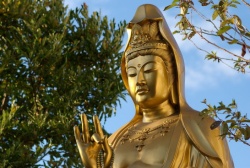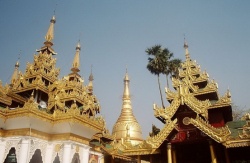Difference between revisions of "The Collapse of the Han Dynasty"
m (1 revision: fix) |
|
(No difference)
| |
Revision as of 13:13, 21 May 2013
Emperor Ling of the Han Dynasty died in 188 or 189, at the age of thirty-three, while military governors were clinging to the greater independence that they had acquired during the war against the Yellow Turbans. A military general who was a popular figure and the half-brother of the dowager empress tried to assert leadership at the palace. He schemed against the court eunuchs and their supporters, and to combat them he invited to the capital general Dong Zhuo and his army from around the Great Wall in the north. But before Dong Zhuo arrived, fighting broke out at the palace. A eunuch murdered the general. The general's allies struck back and burned the palace, killing every eunuch they could find -- or anyone who looked like a eunuch because of lack of beard. And more than 2,000 eunuchs, and supposed eunuchs, died.
Soon after, Dong Zhuo arrived in the capital and put to death both the reigning emperor, Shao, and the empress dowager. He chose a nine year-old prince as emperor and as a front for his rule, the boy acquiring the title Emperor Xian. Dong Zhuo swaggered about the court with his sword, behaving in a manner described as debauched and bestial, while his troops, many of whom were Xiongnu, ran about the capital, pillaging and murdering as they pleased.
Then Dong Zhuo went off to do battle with rival generals. The child emperor, Xian, and his following, including those who belonged to what had been an ineffective palace militia, burned Luoyang and began a trek westward to Chang'an.They took with them -- the story goes -- more than a million civilians, most of whom are said to have died of exhaustion and starvation along the way.
Dong Zhuo's lack of concern for hearts and minds worked against him. His bloodthirstiness and fits of temper alienated his subordinate officers, and in the year 192 his officers assassinated him and threw his corpse to a mob that hated him.
A war for supremacy was taking place among China's generals, and in 196 CE, another general, Cao Cao, found the boy emperor, Xiandi. He took control over the boy and declared himself to be the boy's "imperial minister" and to be the protector of the empire. In the name of Xiandi, Cao Cao drafted more men into his army.
Cao Cao was a vigorous, bright and able leader -- and a poet. His army is said to have numbered as many as a million men. In bloody battles in northern China he defeated warlord after warlord and restored order there. In 208, Cao Cao marched south in an effort to reunify China. The ensuing battle of Jiangling, along the Yangzi River, became one of the best known in China's history. In that battle, Cao Cao confronted the allied armies of Liu Bei and Sun Juan, and that alliance defeated him, driving Cao Cao back north.
Liu Bei was a member of the Han royal family, and he was a man with a kindly disposition. He might have united China, but his ally, Sun Quan, broke with him, fearing that if Liu Bei were successful he would dominate him. Sun Quan established the kingdom of Wu in the south of China, and he allied with Cao Cao, who ruled the kingdom of Wei in the north (named after the Wei kingdom of the Warring States Period (475-221 BCE). Liu Bei built the kingdom of Shu, in Sichuan Province. The phase in China's history called the Three Kingdoms had begun.
The Rise and Fall of an Independent Taoist State
Meanwhile, along the Yangzi River near Sichuan, a surviving Taoist cult with its own army had established a theocratic state. The cult's founder, Zhang Lu, traced his teachings back a couple of generations to his grandfather, Zhang Daoling. Like Zhang Daoling, he performed what were described as miracle healings, and he preached Zhang Daoling's message of physical and moral well-being, claiming that diseases were punishments for evil deeds and that diseases could be cured by remorse and ceremonial confessions. Zhang Lu's community had communal "friendship" meals, and like Zhang Daoling he had a welfare system for his community and storage for grain and meat. He encouraged equality. His community offered the traveling homeless a place to stay and a meal. And it offered leniency to criminals.
Another Taoist, Zhang Xiu set up an independent state nearby. Despite their mutual devotion to Taoism, the communities of Zhang Lu and Zhang Xiu warred against each other -- much as would Christians. And Zhang Lu, it is said, killed Zhang Xiu. Soon thereafter, Zhang Lu had a more formidable opponent, Cao Cao. With his army, Cao Cao overran Zhang Lu's territory. Zhang Lu surrendered to Cao Cao and was rewarded with a fiefdom. It is said that Zhang Lu died shortly thereafter -- in 217. And it came to be legend that twenty-six years after his death he was seen by many witnesses ascending to heaven. The legend held that when his grave was opened, in the year 259, his body was found wholly intact, meaning that he had died only in the sense that he had detached from his corpse and had entered paradise.
Confucianism, Buddhism, Three Kingdoms and the Western Jin Dynasty
With the breakup of Han rule, Xiongnu tribesmen from north of China saw opportunity and made continuous hit and run forays into China's heavily populated regions. As had been happening in Europe, the breakdown of government encouraged peasants to give up their independence and to gather for protection into great estates that had a force of armed men. Peasants fleeing to the great estates escaped imperial taxation and labor drafts, but on the estates they became serfs.
Just as Rome's official pagan religion declined during hard times, so too did Confucianism with the chaos during Han rule. Confucianism had been the ideology of China's gentry and aristocracy and had dominated education and the administration of the empire, but, with virtue scarce among men of power, many of China's elite came to view Confucianism's advocacy of loyalty to rulers of virtue as irrelevant, and many saw Confucianism as having failed to meet the world's challenges.
Those giving up on Confucianism searched for an alternative ideology, and one alternative was Taoism. Another was Buddhism, which according to legend had arrived in China in the year 65 in a dream by the Han emperor Mingdi. A rival theory holds that Buddhism had joined Hinduism in spreading eastward with trade from India, Buddhism arriving in China from across the inland trade route through central Asia during the first century. The royal Han court, it is said, welcomed Buddhism to China. But Buddhism had remained isolated during the remainder of Han rule, adhered to only by Indian merchants -- men who gave money and land for Buddhist temples and who used Buddhist monasteries as banks and warehouses.
The first Chinese to convert to Buddhism were those who had become tenants on Buddhist temple lands. Buddhist teachings were translated into Chinese. Then, with the breakdown of the Han dynasty, conversions to Buddhism spread among China's masses. The converts had little understanding of the details of Buddhist doctrine, but they found consolation in what Buddhism offered. Buddhism's temples and elaborate rituals were impressive, and Buddhism was a warmer message than Confucianism: a message of salvation through moderation or abstinence and a message of pity for all creatures. Both the Hinayana and the Mahayana schools arrived in China, but it was the Mahayana branch of Buddhism with its salvation and helpful gods that would dominate.

